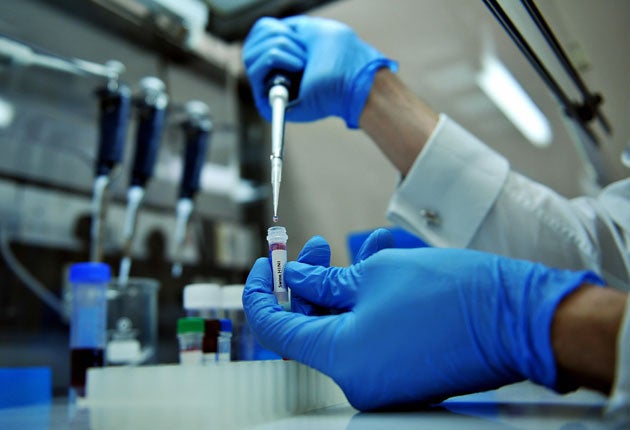Swine flu 'could infect up to half the population'
Health authorities told to set up testing and drug distribution centres in case of autumn outbreak

Your support helps us to tell the story
From reproductive rights to climate change to Big Tech, The Independent is on the ground when the story is developing. Whether it's investigating the financials of Elon Musk's pro-Trump PAC or producing our latest documentary, 'The A Word', which shines a light on the American women fighting for reproductive rights, we know how important it is to parse out the facts from the messaging.
At such a critical moment in US history, we need reporters on the ground. Your donation allows us to keep sending journalists to speak to both sides of the story.
The Independent is trusted by Americans across the entire political spectrum. And unlike many other quality news outlets, we choose not to lock Americans out of our reporting and analysis with paywalls. We believe quality journalism should be available to everyone, paid for by those who can afford it.
Your support makes all the difference.Primary care trusts are to set up anti-viral drug distribution centres and swine flu testing clinics amid fears that the infection could spread out of control.
The Chief Medical Officer, Sir Liam Donaldson, wrote to health authorities last week urging hospitals to test all patients who show signs of flu-like symptoms. He wrote: "Transmission from person to person in this country is increasingly common. There is evidence that sporadic cases are arising with no apparent link either to cases elsewhere in the UK or to travel abroad."
The letter followed an earlier warning from Sir Liam that millions of Britons could fall victim to swine flu in the coming months. Government officials admitted last night that illness rates from the virus could reach 50 per cent.
Primary care trusts are now being briefed to expect that the pandemic could affect as much as 40 per cent of the workforce before the end of the year, with many worried that there could be a surge of cases in the autumn, according to health industry sources.
The Department of Health sought to reassure the public last night. A spokesman said: "Previous pandemics have seen total illness levels of 25-35 per cent. So our plans are as robust as possible, we have based them on illness rates of 50 per cent, though we do not anticipate it being this high in the current pandemic. Based on this figure, the workforce could be reduced by 15-20 per cent at the pandemic's peak. In the unlikely event that every school closed, this could rise to 35 per cent." He said it was impossible to predict when the pandemic would peak, but added: "As part of ongoing planning, the NHS is being asked to ensure that antiviral collection points could, if needed, be put into action in a week."
Keen to avoid panic, the Government is careful to present official statistics showing "laboratory-confirmed" cases, which currently stand at 2,244. Yet the true scale of infections is far higher than headline figures suggest. The total number of cases either confirmed by laboratory tests or "clinically presumed" currently stands at 3,725.
Almost 400 cases of swine flu in Britain have occurred as a result of in-country transmission, according to latest figures from the European Centre for Disease Control. The virus is continuing to gain ground, with a number of people falling ill without having been abroad or in contact with previously confirmed cases – a signal that transmission is "growing in some areas of the country", according to the Health Protection Agency. The HPA said: "We would need to have a significant number of people where you really don't know how they have got it for it to be classified as sustained community transmission. We are getting closer to that, but are not there yet."
This comes a week after Jacqui Fleming, 38, of Glasgow, became the first person to die from swine flu outside North America. Since then, health officials in Birmingham have said they can no longer contain the spread of the virus, and in Glasgow, a series of swine flu testing clinics have been set up.
Meanwhile, calls to NHS hotlines have almost doubled in the past week. Latest figures from NHS Direct reveal that 2,356 calls about swine flu were made on Thursday 18 June, up from 1,280 a week earlier.
Under a new scheme that began in June, hundreds of people calling NHS Direct about swine flu have been sent swab kits to return for testing.
Economic toll: Pandemic to cost Britain £42bn
£42bn losses are predicted to hit Britain as a result of a three per cent fall in gross domestic product (GDP) due to the swine flu pandemic, according to a new report from the Oxford Economics think tank, due to be released tomorrow. Researchers claim that swine flu could threaten already fragile businesses and put further strains on financial markets in what could become a "vicious cycle that postpones the recovery".
Deflation is a "significant risk" as a result of the pandemic's impact on the economy – putting back economic recovery by two years, says the report. The predictions are based on a 30 per cent infection rate, should a pandemic begin in October and last for six months.
A $2.5 trillion cut in global GDP is a possibility – with a flu outbreak in the autumn hitting the world economy just as it starts to recover from the credit crunch.
Join our commenting forum
Join thought-provoking conversations, follow other Independent readers and see their replies
0Comments